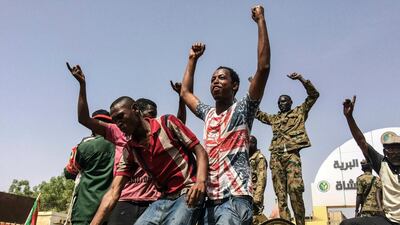Sudan’s ruling generals have rejected key parts of a constitutional draft put forward by protest leaders, in a sign of growing tensions between the mainly liberal representatives of the protest movement and the conservative military in the wake of last month’s overthrow of President Omar Al Bashir.
Proposals by Sudanese protest leaders on the structure and powers of an interim administration have drawn a response from Sudan's ruling generals that, while stating their agreement in principle, rejected key elements of the political blueprint and threatened to call for an election in six months if no agreement is reached by then.
The proposals are part of ongoing negotiations between the protest leaders – an alliance called the "Declaration of Change and Freedom Forces" – and the generals, who last month removed the authoritarian Al Bashir after four months of deadly street protests against his 29-year rule.
Spokesmen for the Change and Freedom Forces on Wednesday said the generals' response to the constitutional draft suggested that they were more interested in prolonging the negotiations than starting the transitional period with a civilian administration at the helm.
"The kind of negotiations we are seeking is the one that directly leads to the handover of power" to a civilian government,"no distractions, no vicious circles," one of the spokesmen told a Khartoum news conference, alluding to what appeared to be nit-picking by the military over technicalities in the political blueprint.
The protest leaders seek a sovereign council, a cabinet and a legislative council. They also want a four-year transitional period during which a new constitution is drafted. They are also asking for the armed forces to have a limited representation on the sovereign council, leaving civilians as leaders and the overwhelming majority of the three councils. They also want all political parties that joined Al Bashir-led latest governments excluded from all three bodies.
The spokesmen also threatened to "step up" street protests, including a general strike, if negotiations remain deadlocked.
The military, they said, may be mistakenly hoping that a month-long sit in outside the army headquarters will thin out over Ramadan as the faithful fast from dawn to sunset in Khartoum's intense May heat. Supporters will remain on the streets for the long haul, they said.
The spokesmen also accused the generals of attempting to stain the image of the protest leaders as divided and power hungry, and to be negotiating through the media rather than direct, face-to-face talks.
The differences between the two sides illustrate the gap between the predominantly liberal and left-leaning Change and Freedom Forces and the conservative generals viewed by most Sudanese as an extension of Al Bashir's rule. If the gap is not bridged soon, Sudan's already crippling economic woes will be deepened, compounding the suffering of most Sudanese who have been struggling to make ends meet under Al Bashir. Some politicians, including former prime minister Sadeq Al Mahdi, have warned that a deadlock could invite a coup that would result in direct military rule.
The military has ruled Sudan for most of the 63 years since independence in 1956. The country's three democratic experiments: 1956 to 58; 1964 to 69; and 1986 to 89, all ended in military coups.
Delivering the transitional military council's response, Lieutenant General Shams Eldeen Kabbashi noted during a late Tuesday news conference that the draft made no mention of Islamic Sharia laws as the main source of legislation, saying the council wanted them along with local "norms" and "traditions" as the basis for laws.
He also suggested that the military council disapproved of the Change and Freedom Forces' proposal for a four-year transitional period ahead of elections.
The generals believe two years are sufficient to prepare the country for its transition to democratic rule, said Lt Gen Kabbashi, who threatened elections within six months' time if no agreement is reached with the protest leaders.
The Change and Freedom Forces say they want a longer transitional period to allow time to dismantle the "deep state" – political parlance for Islamist control over the country's security agencies, civil service and judiciary. They also hope this will be sufficient time to end conflicts simmering west and south of Khartoum and subsequently allow the repatriation home of millions of displaced Sudanese.
The transitional military council believes that the power to declare a state of emergency should go to a sovereign authority, not the Cabinet as suggested by the Change and Freedom forces in its draft.
On the whole, Lt Gen Kabbashi's response appeared to suggest that the generals wanted to safeguard much of Al Bashir's political legacy at a time when the protest leaders seek a radical overhaul of the country's political system.
Sharia laws, for example, were first introduced in 1983 by dictator Jaafar Nimeiri, who was later overthrown by the military following a popular uprising in 1985. Their introduction fueled an insurgency that at the time raged in Sudan's mainly Christian and animist south, which later seceded in 2011.
The laws remained in force, if not strictly implemented, under a democratically elected but dysfunctional government that came to office in 1986 and overthrown three years later by a military coup led by Al Bashir and his Islamist allies.
Under Al Bashir, Sharia laws came to the fore as the main law of the land, although most Sudanese say the religious rhetoric of the former leader and the clique of supporters and associates around him concealed their corruption and gross mismanagement of the country's resources.


